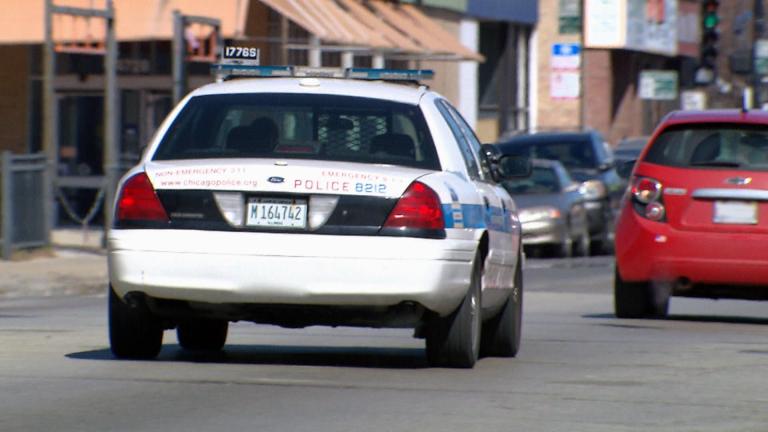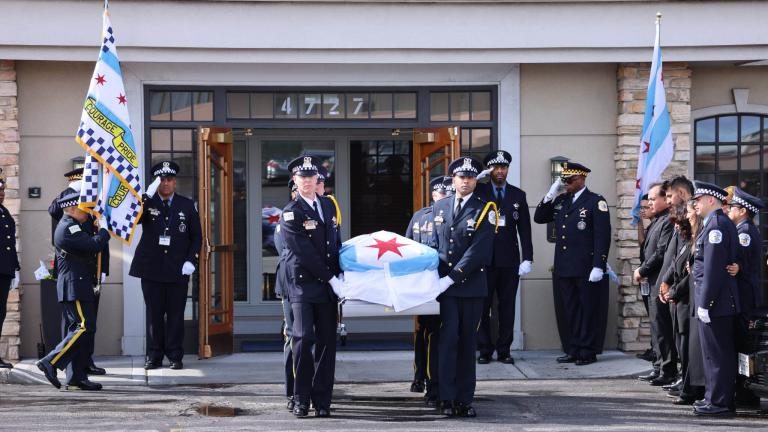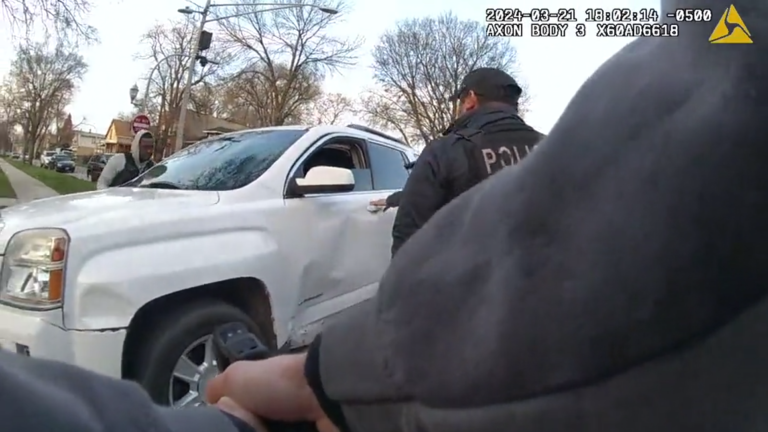Video: Joining “Black Voices” are Marine Corps veteran José Manuel Almanza, a plaintiff in the case who lives in Little Village; ACLU of Illinois senior attorney Alexandra Block, who is the lead attorney in the case; and community organizer Eric Wilkins, a plaintiff in the case who lives in Roseland. WTTW News reached out to the Chicago Law Department, but a spokesperson declined to comment, citing the city’s policy of not discussing pending litigation. (Produced by Paul Caine)
A federal lawsuit filed Tuesday alleges Chicago police targeted Black and Latino Chicagoans with a massive campaign of traffic stops over the past six years, calling it the latest chapter in the department’s “long and sordid history” of racist discrimination.
The lawsuit filed by the American Civil Liberties Union of Illinois accuses the Chicago Police Department of making more than 1 millon traffic stops between 2016 and 2022 based on dubious evidence of minor violations that took direct aim at Black and Latino Chicagoans but spared White Chicagoans. The suit asks a federal judge to certify the case as a class action, potentially covering millions of Chicagoans.
A spokesperson for the city’s Law Department declined to comment when contacted by WTTW News, citing the city’s policy of not discussing pending litigation.
The number of traffic stops conducted by Chicago police officers surged 600% between 2015 and 2022, after department officials agreed to curtail the use of stop-and-frisk as part of an agreement with the ACLU after the civil rights organization released a report in March 2015 that found officers stopped Black Chicagoans at a far higher rate than Latino or White Chicagoans.
“While defendants have changed their mass stop tactics over time as each iteration was found or shown to be unlawfully discriminatory, defendants’ overall strategy has remained consistent for decades: stop and harass — and often physically harm — hundreds of thousands of Black and Latino Chicagoans every year, almost all of whom are simply trying to go about their daily lives and get to work, school, errands, family obligations and the like,” according to the lawsuit. “Defendants’ mass traffic stop program is simply the newest chapter in their long and sordid history of employing mass-stop policing tactics that discriminate on the basis of race and national origin, touted as a campaign to supposedly fight crime in Chicago.”
The lawsuit cites a June 14 report by the team overseeing court-ordered reforms of the Chicago Police Department that found evidence to suggest a direct correlation between the significant increase in the rate of reported traffic stops by police officers and a nearly equal drop in the number of pedestrian stops.
Black Chicagoans were four to seven times more likely to be pulled over by Chicago Police officers than White Chicagoans between 2016 and 2022, while Latino Chicagoans were twice as likely to be stopped by police while driving. In many cases, police officers justified the stop by saying they witnessed an infraction such as a burned-out headlight or an expired vehicle registration sticker, according to the lawsuit.
While officers were more likely to find drugs or weapons in cars driven by White Chicagoans, they were far more likely to search vehicles driven by Black Chicagoans, according to city data cited by the lawsuit.
Approximately 70% of the vehicles that police officers searched during traffic stops between 2016 and 2022 were driven by Black Chicagoans, who make up less than 30% of Chicago’s population. Less than 5% of cars driven by White Chicagoans were searched by officers after being stopped, according to city data cited by the lawsuit.
ACLU of Illinois lawyer Alexandra Block, the lead attorney on the case, said the Chicago Police Department has never offered an explanation as to why there is such a disparity in the rate of stops.
“In various public statements that have been made, for example, by former Mayor Lori Lightfoot and former Police Superintendent David Brown, they have vaguely said that they concentrate traffic stops in areas where there are higher crime rates,” Block said. “But what we show in this complaint is that there is no association between increasing traffic stops and decreasing serious crimes in Chicago.”
In 2022, officers found drugs or weapons in 9% of their searches of White drivers’ vehicles, but found contraband in only 6.4% of their searches of Black drivers’ vehicles, according to city data cited by the lawsuit.
There is no evidence that the increase in traffic stops has helped police officers fight crime by getting drugs, guns or other weapons off the street, according to the lawsuit, since the total number of major crimes essentially unchanged before the COVID-19 pandemic upended policing in Chicago and across the nation and triggered a surge in crime that has yet to fully recede.
Officers found drugs in just 0.3% of the traffic stops conducted between 2016 and 2022 and weapons in just 0.05% of traffic stops, according to city data cited in the lawsuit.
In addition, just 3.4% of traffic stops in 2022 resulted in a citation, according to city data cited in the lawsuit.
In 2022, less than a third of all traffic stops were prompted by evidence the driver had committed a moving violation such as speeding or reckless driving, according to the lawsuit.
“Not only do these discriminatory traffic stops, frisks and searches cause people of color in Chicago to suffer fear, terror and embarrassment, as well as physical harm when stops escalate to violence, the mass traffic stop program decreases public safety by hindering community cooperation that is essential for effective crime prevention and investigation, and it diverts police resources away from critical public safety needs such as responding to 911 calls and completing criminal investigations,” according to the lawsuit.
Court records show settlement negotiations are underway in a class-action lawsuit brought in 2015 by Chicagoans who allege their constitutional rights were violated after they were stopped and frisked by officers.
The lawsuit also alleges that former Mayors Rahm Emanuel and Lori Lightfoot enforced a system of quotas, requiring officers to pull over a certain number of cars during their shifts or face consequences.
In addition, the lawsuit claims police officials failed to report tens of thousands of traffic stops as required to the Illinois Department of Transportation, and failed to properly train and supervise officers to comply with departmental policy during and regarding traffic stops.
The ACLU contends that the Chicago Police Department has simply used traffic stops to replace stop-and-frisk when that policy fell into disrepute and was curtailed.
“CPD is using the same mass stop tactics but shifted from pedestrian stops to traffic stops after our 2015 stop-and-frisk settlement,” Block said. “And this is not accidental. It’s intentional. From the top brass on down for the last six years, they have put in place a program of traffic stop quotas that require officers to make a certain minimum numbers of traffic stops.”
There are five lead plaintiffs in the lawsuit filed Tuesday by the ACLU, all of whom say they have been stopped repeatedly by Chicago Police officers.
Mahari Bell, a 25-year-old Black South Shore man who works as a driver for the delivery app DoorDash, said he was pulled over by Chicago police officers four times in April and May 2022 — with one stop coming just six hours after the previous encounter.
In addition, Bell was pulled over by officers three times within a four-day period in March, according to the lawsuit.
Bell was not cited as a result of any of those stops for a traffic violation, nor was he arrested, according to the lawsuit.
“The stops make Mr. Bell feel like he is just a statistic to CPD — just another data point and another young Black man to stop, investigate, and toss aside — rather than a human being who is trying to go about his life in peace,” according to the lawsuit.
Another plaintiff in the case is José Manuel Almanza, Jr., 35, a former Marine who lives in Little Village.
Since January, Almanza has been pulled over four times. Like Bell, he was never cited.
“CPD has humiliated Mr. Almanza by pulling him from his vehicle and forcing him to stand in public, in his own neighborhood in front of dozens of passersby, while officers rifle through his vehicle as if he has committed a crime,” according to the lawsuit.
Almanza told WTTW News the officers pulling him over are often disrespectful.
“They always have a tone where they’re, like, I’m stupid and they’re smarter than me,” Almanza said. “Oftentimes, they’ll approach my car with their hand on their holster.”
Eric Wilkins, another plaintiff in the case, said that police often pull him over “assuming that because of the car I drive I have to be doing some type of illegal activity.”
WTTW News producer Paul Caine contributed.
Note: This article was published June 27 and updated with video and additional quotes on June 30.
Contact Heather Cherone: @HeatherCherone | (773) 569-1863 | [email protected]







